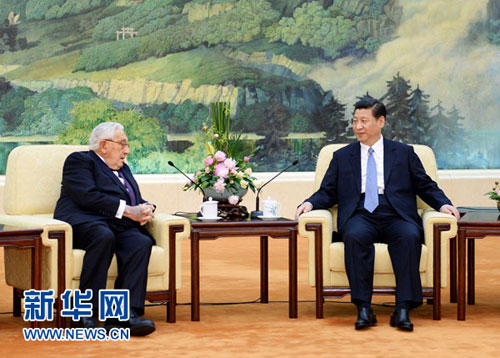
On April 24, 2013, Chinese President Xi Jinping met respectively with former U.S. Secretary of State Henry Kissinger and former U.S. Treasury Secretary Henry Paulson at the Great Hall of the People.
During the meeting with Kissinger, Xi appreciated his long-standing commitment and special contributions to promoting the development of Sino-U.S. relations. Xi said during his recent phone talks with President Obama, the two sides agreed to continue advancing the Sino-U.S. cooperative partnership and blaze a trail for a new-type relationship between major countries, which identified the strategic positioning and development direction of bilateral relations. "I'm pleased to see the China-U.S. relations have seen a smooth transition and a good start since the new leaderships of the two nations came to power," Xi said. Xi suggested the two sides further intensify high-level exchange and dialogue, sort out common interests and boost cooperation in various fields based on mutual respect, equality and handling their differences well. The two sides should take an overall perspective in understanding the current situation and steer the bilateral relationship in the right direction. "The establishment of a new type of major-country relationship between China and the United States needs an accumulation of dribs and drabs," Xi told Kissinger, proposing the two to step up their pragmatic cooperation and maintain communication and coordination on regional and international issues in an aim to promote long-term, healthy and stable development of bilateral relations.
Kissinger said he was honored to be able to contribute to the development of U.S.-China relations and was touched by the friendly feelings generations of Chinese leaders and the Chinese people hold for him. He highlighted the significance of U.S.-China relations to both countries and the world at large, noting that the two nations should deepen their communication and expand cooperation on major issues concerning peace and stability, which would not only help the sustainable development of bilateral ties, but also be conducive to world stability and development.

In an earlier meeting with Paulson, Xi first thanked the former U.S. Treasury Secretary for his profound condolences over the devastating earthquake in southwest China's Sichuan Province. Xi said the rescue operations and disaster relief work in China are proceeding in an orderly and effective manner. The Chinese government and people have the confidence and ability to overcome difficulties and win the victory in quake relief and post-disaster reconstruction.
Xi said that the current Sino-U.S. relations have maintained stable development in general. The leaders of the two countries have maintained close communication and the two sides have established more than 90 intergovernmental dialogue mechanisms and carried out mutually beneficial cooperation in a wide range of areas. "China is striving to achieve the dream of the great rejuvenation of the Chinese nation and moving towards its 'two 100-year' goals, while the United States is also on its way of reform and economic recovery," Xi said. The cooperation between the two countries enjoys broad prospects. The Chinese President also spoke highly of the efforts made by the Paulson Institute, an independent center at the University of Chicago, in advancing the bilateral cooperation in fields of energy, environment, climate and personnel training and encouraged the center to continue to play an active role in the development of bilateral relations.
Paulson said he felt excited that the new leaderships of the two nations both attached great importance to promoting bilateral ties. He said the two countries share common opportunities as well as challenges in economic recovery, energy, environment and climate change, which require further cooperation. He pledged the Paulson Institute is ready to continue making efforts in this regard.